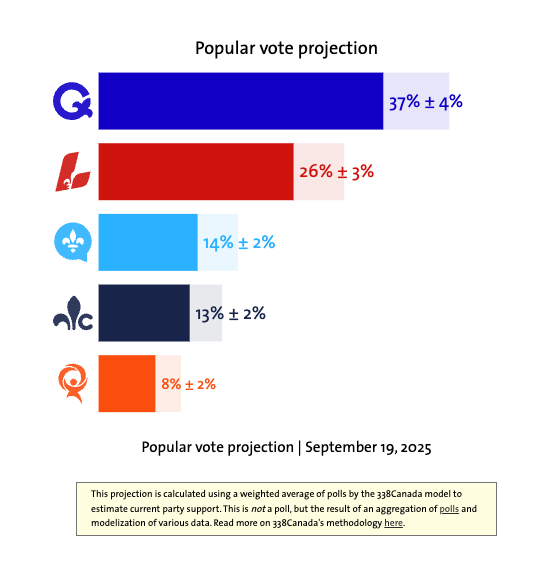Setting the scene
Quebec’s National Assembly returned on September 30th, following a cabinet shuffle and brief prorogation in an attempt to reset the CAQ government’s direction. To guide his new cabinet, Premier Legault introduced a set of new priorities: the economy, bureaucratic efficiency, security, and identity. The roughly two-week prorogation was framed as an opportunity to give new Ministers time to understand their portfolios and the new, more focused, directives the government will follow for the upcoming year.
The next Quebec provincial general election is not before next year and is currently scheduled for October 5, 2026, but the government has some work to do in order to regain the trust and support of Quebecers. Notably, however, since 1950 only Jean Charest was able to secure a third mandate as premier in 2008.
The CAQ and Premier Legault continue to face low approval ratings, with the majority of Quebecers critical of the current government. The Parti Québécois, led by Paul St-Pierre Plamondon, is currently projected 37% of the popular vote, if the election was held today. The Liberal Party, under the new leadership of Pablo Rodriguez, has moved into the projected official opposition, with 338Canada putting them at approximately 26% of the popular vote. The CAQ, while projected to retain 14% of the popular vote, may face vote efficiency issues as they currently are projected to not pick-up any seats through these initial projections.

Premier Legault also faces some internal pushback as the Assembly returns, which is represented through the departure of some key ministers, including Maïté Blanchette Vézina, who now sits as an Independent and has publicly called for Legault’s resignation. She stated that there was a loss of confidence in Legault’s leadership. The most recent cabinet shuffle revealed the broader extent of internal discontent within the governing party that has been plagued by scandals throughout its time in power.
Priorities
The CAQ government laid out a new set of priorities after the cabinet shuffle, which are aimed to save the party from declining popularity in the polls ahead of the October 2026 election. They are currently projected to be wiped from the National Assembly.
The economy:
- Premier Legault, alongside Economy Minister Fréchette, have stated that they will reveal a new economic vision for Quebec in the upcoming weeks. This plan is expected to help address: the cost-of-living crisis, economic competitiveness, trading tensions with the US, and energy development. Premier Legault also stated that the province will prioritize collaboration with Indigenous communities for the acceleration of strategic provinces, and will evaluate the possibility for agreements with other provinces, to build off the success of the recently announced MOU between Newfoundland and Quebec. The Finance Minister Eric Girard has been mandated to identify new affordability measures to support Quebecers most impacted by the cost-of-living crisis.
Bureaucratic efficiency:
- Premier Legault has stated that the Quebec public service needs to be overhauled, describing it as being in a state of “lethargy”, requiring all departments and agencies to identify efficiencies. France-Èlaine Duranceau, the newly appointed President of the Treasury Board, is in charge of leading this initiative, and she will soon announce her targets for near-term reductions in the bureaucracy. The reduction of red tape and acceleration of regulatory approvals was also identified as a priority.
Security:
- Public safety remains a major concern in Quebec. Premier Legault has appointed Ian Lafrenière as the Minister of Public Security, with the mandate of restoring public trust in law enforcement, addressing urban safety concerns, and overseeing reforms in emergency services. Minister Lafrenière will present a plan in the coming months on addressing criminal reform. To address concerns around mental health and substance use, Legault also indicated that the government will amend Bill-38, An Act to amend the Act respecting end-of-life care and other legislative provisions.
Identity:
- Premier Legault continues to frame Quebec identity as a major issue, specifically in terms of immigration. He’s had clashes with the federal government regarding the “uncontrolled immigration” and is pushing for a reduction of 200,000 temporary immigrants in Montreal and Laval.
- He also is advocating for stronger protections for the French language as well as policies that reinforce cultural and secular values.
With the goal of demonstrating quick action, Premier Legault committed to introducing several new bills in the coming weeks in his opening speech. To complement the new economic plan that Economy minister Christine Frechette will present, the government will also table legislation aimed at accelerating economic and energy projects of strategic interest to Quebec. The new Labour minister has been mandated to present a bill aimed at modernizing the union system, and the government will introduce a new law to reinforce secularism and protect Quebec’s shared values.
Beyond the four central priorities, Premier Legault also indicated that the government will take some new approaches to funding projects of strategic interest for the Quebec economy. In a departure from the provinces’ traditional view on defence spending, the Premier directed Invest Quebec to invest in defence companies, and he reiterated his support for the federal government’s focus on increasing effort in this area. Defence, along with aerospace, clean electricity, artificial intelligence, mining and critical minerals, and green aluminum and steel will be central to the economic focus of the next year. In an effort to drive capital into the domestic economy, Premier Legault has requested that the Caisse de dépôt et placement du Québec (CDOQ), increase its share of investments in Quebec-based projects and companies.
Opposition
Given the CAQ government is quickly losing support within the province, the political opposition is gaining momentum and reshaping Quebec’s provincial political dynamic.
Parti Québécois (PQ)
The PQ has gained popularity in rural Quebec and the suburbs, emerging as the strongest opposition force. They have performed well in recent byelections, in part due to their leader’s messaging on Quebec’s sovereignty and identity. The PQ will be a likely frontrunner in any byelections in the future, which will allow them to build more momentum towards the next provincial election. However, with the populations focus on repairing the Quebec economy, the PQ will need to find its way to expand beyond the safety net of nationalism that generally allows the party to be a safe fallback for Quebecers who are unsure how to vote. This along with the Party’s ability to break into the urban areas of Quebec will be sure signs of increasing momentum.
Quebec Liberal Party
The Quebec Liberal Party has undergone a leadership change since the past election, with Pablo Rodriguez, a former federal Liberal cabinet minister, taking the helm. Thus far, he hasn’t made significant moves as the leader, other than the decision to not seek out a seat in the National Assembly during a byelection. The party has failed to make any gains since the election of their new leader, but has benefited from the poor polling performance of the CAQ.
Other parties
Québec Solidaire, although continuing to sustain a progressive platform, have not seen any significant changes in recently polling. They maintain a stable base, often shared with the PQ, and they have not been able to capitalize on the decline of the CAQ as well as the Parti Québécois have.
Legislation to watch
The following bills were introduced in the previous session but had not yet received assent. If the government chooses to continue pursuing these bills they will have to be reintroduced in the Assembly:
- Bill 82 — An Act respecting the national digital identity and amending other provisions: Tabling of committee report – Detailed consideration
- Bill 94 — An Act to, in particular, reinforce laicity in the education network and to amend various legislative provisions: Adoption of the principle
- Bill 97 — An Act mainly to modernize the forest regime: Tabling of committee report – Detailed consideration
- Bill 99 — An Act to give effect to fiscal measure announced in the Update on Québec’s Economic and Financial Situation presented on 21 November 2024 and in the Budget Speech delivered on 25 March 2025 and to certain other measures: Tabling of committee report – Detailed consideration
- Bill 101 — An Act to improve certain labour laws: Adoption in principle
- Bill 103 — An Act mainly to regulate supervised consumption sites in order to promote their harmonious cohabitation with the community: Committee consultations
- Bill 104 — An Act to amend various provisions in particular to follow up on certain requests from the municipal sector: Presentation
- Bill 106 — An Act mainly to establish the collective responsibility and the accountability of physicians with respect to improvement of access to medical services: Adoption of the principle
- Bill 107 — An Act to amend various provisions concerning mainly the Comité consultatif sur l’accessibilité financière aux études and the Commission d’évaluation de l’enseignement collégial: Presentation
- Bill 108 — An Act to amend the Act respecting the Société de développement des entreprises culturelles to modernize the Société’s financial service offer and to recognize the digital creativity industry: Presentation
- Bill 109 — An Act to affirm the cultural sovereignty of Québec and to enact the Act respecting the discoverability of French-language cultural content in the digital environment: Presentation
- Bill 110 — An Act respecting the Office franco-québécois pour la jeunesse and the Office Québec-Monde pour la jeunesse: Presentation
- Bill 111 — An Act to modernize the Cooperatives Act and to amend other provisions: Presentation
- Bill 112 — An Act to facilitate the trade of goods and the mobility of labour from the other provinces and the territories of Canada: Presentation


